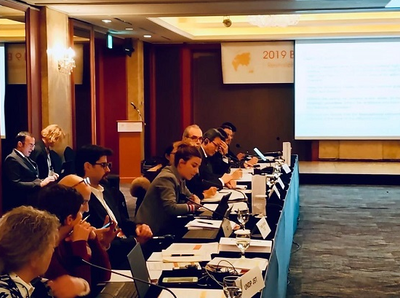- Catalonia currently occupies the ORU-Fogar network’s seat on the steering committee of the platform, which brings together over 150 countries
- The Director-General for Global Affairs stressed the important role of sub-national governments in implementing the 2030 Agenda

The Director-General for Global Affairs of the Ministry for Foreign Action, Institutional Relations and Transparency, Elisabet Nebreda, is in South Korea this week to participate in a meeting of the Global Partnership for Effective Development Cooperation (GPEDC). The GPEDC, an initiative of the United Nations Development Programme (UNDP) and the Organisation for Economic Cooperation and Development (OECD), is made up of representatives of 161 countries and 56 organisations. The Global Partnership works to increase the impact of development cooperation in achieving the Sustainable Development Goals (SDGs) of the 2030 Agenda.
Within this framework, the Government of Catalonia is in Seoul in representation of the ORU-Fogar network, an international organisation of regions around world. ORU-Fogar is a member of the steering committee of the GPEDC partnership, and at the meeting now under way, Catalonia will be speaking for its member regions. The multi-stakeholder governing body meets biannually, and its 25 members include representatives of states, the European Commission, international bodies, trade unions, civil society organisations and multilateral development banks. At its 18th meeting, the steering committee will be discussing the new work programme of the Global Partnership for Effective Development Cooperation and its strategic priorities.
The role of sub-national governments in implementing the SDGs
During the meeting of the steering committee, Nebreda stressed the “vitally important role sub-national governments play in global agendas”, which, though defined by states in multilateral forums, require the involvement of these actors. The director-general noted that according to an OECD report, 65% of the 169 targets linked to the 17 SDGs will not be achieved without the engagement of local and regional governments and coordination with these sub-national actors.
Speaking on behalf of ORU-Fogar member regions, Nebreda said: “Sub-national governments around the world, especially those that enjoy or aspire to a high degree of sovereignty and have been delegated significant legislative powers, have led the SDG implementation process.” She also pointed out that these actors are often more agile than national governments. Nebreda cited the example of the Catalan and Basque governments, which “developed their plans for implementing the 2030 Agenda before the Spanish state prepared its own”.
For this reason, Nebreda said that forums such as the Global Partnership “should recognise the key role of local and regional governments and make the most of their knowledge, resources and commitments to promote more decentralised and effective development cooperation”. “This will undoubtedly promote local leadership, transparency and accountability, as well as facilitating the creation of more innovative and inclusive partnerships,” she added.
In September of this year, the Government of Catalonia approved the National Plan for the Implementation of the 2030 Agenda, which translates the 17 Sustainable Development Goals and 169 associated targets into 920 commitments and pragmatic goals set by the Catalan executive. To engage actors beyond the sphere of government action, the National Plan will be followed by a National Agreement for the 2030 Agenda. This agreement, currently being developed through a participatory process, will give rise to the Catalonia 2030 Alliance, a partnership of public and private actors that will serve as a forum for sharing Catalonia’s commitments and achieving the SDGs.
The origin of the GPEDC
The Global Partnership for Effective Development Cooperation was created in 2011 at the Fourth High-Level Forum on Aid Effectiveness in Busan, South Korea. States and international organisations involved in development agreed to create the GPEDC to improve the way the international community works to achieve development results.